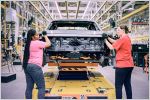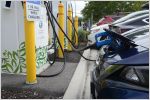Published in Hill Times (Dec. 8, 2008)
One way or the other, one party or three, Canada's economy is in need of a jump-start. To reinvigorate our chilled economy, we need to diversify our economic base and create new jobs that will put money into the pockets of Canadian workers. And to be successful in our efforts, we need to overcome the false distinction between "economic performance" and "environmental performance".
The economic chill has led to a fever of political tension in Ottawa. Meanwhile, global warming is turning up the heat on the one home all parties share — planet Earth. We are facing an acute economic calamity interlaid with a chronic environmental crisis.
So, where do we find the remedy to deal with our multiple ailments? This is a fantastic opportunity to spark the economy and save the environment with a double-dividend green economic stimulus.
The Green Budget Coalition, a collection of 20 non-profit groups, just published its annual report on urgent environmental priorities. While many of these recommendations offer short and long-term economic benefits, at least three ought to be a part of an immediate economic revival.
First, save energy and create jobs: volatile energy costs add strain first and foremost on fixed and low income households, small and medium companies, and school boards and public health facilities. Existing energy efficiency technologies, installed by today's trades people, will produce positive returns on investment financially and environmentally. Many of the energy efficiency solutions — better windows, insulation, high-efficiency appliances — are manufactured right here in Canada.
For energy efficiency and small scale renewable energy systems access to capital can be a primary barrier. The federal government should make $2.5 billion in low interest loans available to stimulate this industry. To help trades people adapt their skills, mobilize the network of trades-schools to provide intensive training programs. Meanwhile, make energy auditors available at minimal cost to building owners and inject another $2.5 billion over the next 5 years into direct support. This not only puts thousands of people back to work, but it also lowers energy bills, and frees up income just like a tax cut.
Second, invest in clean energy to help Canada rapidly catch up to countries like Germany, Spain and the United States in commitments to grid-scale renewable energy. President-elect Obama has made a $150 billion commitment over 10 years to clean energy. Canada has a choice to either keep pace or fall behind our largest trade partner. Last year the United States became the world’s largest market for wind energy, and having just renewed their incentive program, Canada will find it increasingly hard to compete for investment if we do not step up too.
Invest $2.8 billion in a renewed ecoENERGY renewable power program. This program is a proven success at stimulating renewable energy projects such as wind power; in fact, it is oversubscribed. This will not only create jobs and deliver clean energy, but could provide a stable signal to a new wind turbine manufacturing industry in Canada.
The North American Electric Reliability Corporation predicts that over the next 10 years, 145,000 MW of wind power will be built in North America, and Canadians must be a part of this industry.
Third, we need to modernize our transit systems. Our cities are sprawling, our commuting times and associated loss in productivity are a drag on our economy, while at the same time much of our existing transit infrastructure is aging. The Canadian Urban Transit Association has identified the need for $30 billion in transit infrastructure spending required over the next five years. Many buses and train systems are manufactured in Canada, again helping revive a sector currently at risk. We know we need to invest in transit, let’s simply accelerate that investment by making the commitment now.
By focusing on at least these three priority areas, the double dividend payback for the economy and the environment is significant. The investments in energy efficiency will have strong double-digit returns on investment – this will increase productivity, diversify our economy, create jobs, and reduce our environmental footprint. The investments in transit infrastructure need to happen in the future anyways, so accelerating them simply puts us ahead and makes our cities more livable and more productive earlier. The investment in the ecoEnergy program is the bare minimum to keep pace with the U.S.
All of these efforts work right across Canada, in every province and every territory, in every city — small and large.
Instead of political squabbling, Canadians want to see hope and vision. The next successful Canadian budget should mend our economy and work towards solving the environmental issues that plague the planet.
Any government that puts a strong, visionary green economic plan on the table will reap double dividends and produce a vision that all parties would be compelled to support.
Dr. Marlo Raynolds is Executive Director of the Pembina Institute, a non-profit think tank that advances sustainable energy solutions.
Marlo Raynolds was the executive director of the Pembina Institute until January 2011.



